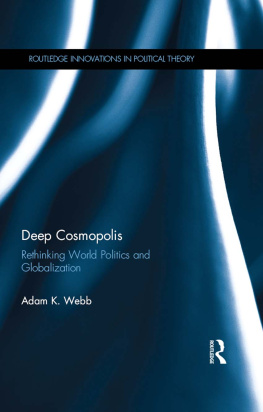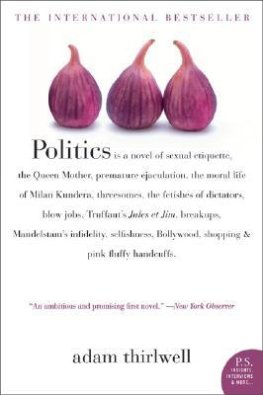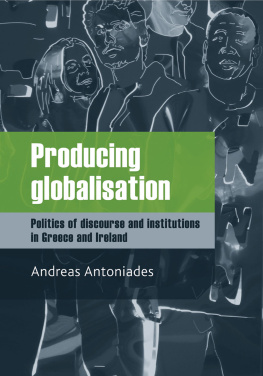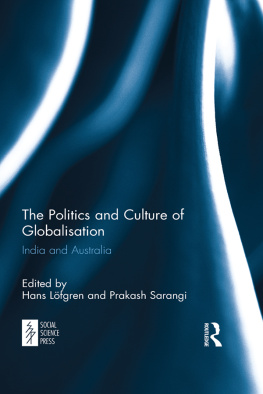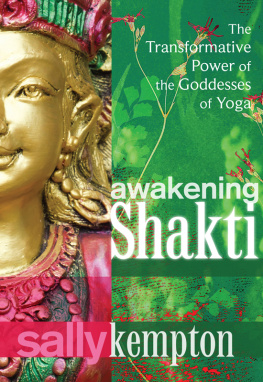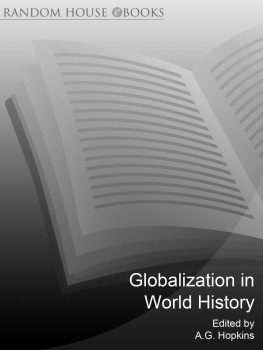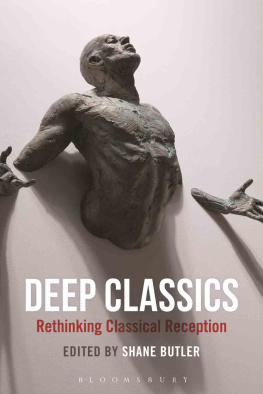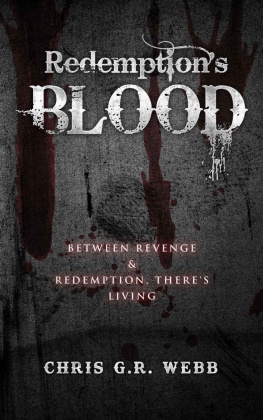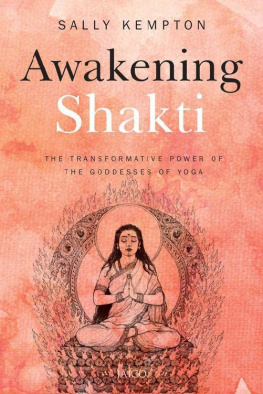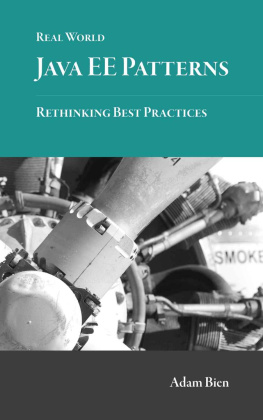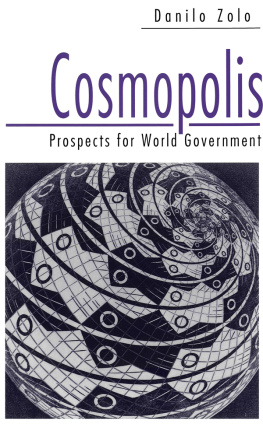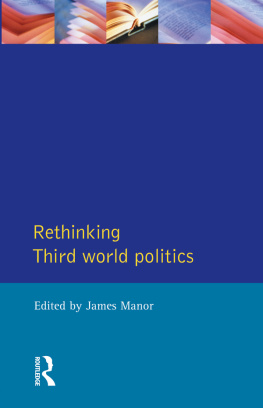Adam Webb brilliantly explores an alternative path to globalization with dashing originality and stunning erudition. Webb defends a cosmopolitanism that is at once rooted and diverse, culturally rich and historically sensitive. His vision of a deep cosmopolis draws at once on the virtues of local knowledge and the universalist impulse that is embedded within all human cultures, yet resists the homogenized and flattened form of globalization encouraged by an elite class dismissive of local diversity and impatient with the rich complexity of civilizations.
Patrick Deneen, University of Notre Dame, USA
Deep Cosmopolis
Too often, observers of globalisation take for granted that the common ground across cultures is a thin layer of consumerism and perhaps human rights. If so, then anything deeper and more traditional would be placebound and probably destined for the dustbin of history. But must this be so? Must we assumeas both liberals and traditionalists now tend to dothat one cannot be a cosmopolitan and take traditions seriously at the same time? This book offers a radically different argument about how traditions and global citizenship can meet, and suggests some important lessons for the contours of globalisation in our own time.
Adam K. Webb argues that if we look back before modernity, we find a very different line of thinking about what it means to take the whole world as ones horizon. Digging into some fascinating currents of thought and practice in the ancient world, the Middle Ages, and the early modern period, across all major civilisations, Webb is able to reveal patterns of deep cosmopolitanism, with its logic quite unlike that of liberal globalisation today. In their more cosmopolitan moments, everyone from clerics to pilgrims to empire-builders was inclined to look for deep ethical parallelspoints of contactamong civilisations and traditions. Once modernity swept aside the old civilisations, however, that promise was largely forgotten. We now have an impoverished view of what it means to embrace a tradition and even what kinds of conversations across traditions are possible. Webb draws out the lessons of deep cosmopolitanism for our own time. If revived, it has something to say about phenomena from the rise of new non-Western powers such as China and India and what they offer the world, to religious tolerance, to global civil society, to cross-border migration.
Deep Cosmopolis traces an alternative strand of cosmopolitan thinking that cuts across centuries and civilisations. It advances a new perspective on world history, and a distinctive vision of globalisation for this century which has the real potential to resonate with us all.
Adam K. Webb is Resident Professor of Political Science at the Hopkins-Nanjing Centre, which is one of the two overseas branches of the Johns Hopkins University School of Advanced International Studies.
Routledge Innovations in Political Theory
1 A Radical Green Political Theory
Alan Carter
2 Rational Woman
A feminist critique of dualism
Raia Prokhovnik
3 Rethinking State Theory
Mark J. Smith
4 Gramsci and Contemporary Politics
Beyond pessimism of the intellect
Anne Showstack Sassoon
5 Post-Ecologist Politics
Social theory and the abdication of the ecologist paradigm
Ingolfur Blhdorn
6 Ecological Relations
Susan Board
7 The Political Theory of Global Citizenship
April Carter
8 Democracy and National Pluralism
Edited by Ferran Requejo
9 Civil Society and Democratic Theory
Alternative voices
Gideon Baker
10 Ethics and Politics in Contemporary Theory
Between critical theory and post-Marxism
Mark Devenney
11 Citizenship and Identity
Towards a new republic
John Schwarzmantel
12 Multiculturalism, Identity and Rights
Edited by Bruce Haddock and Peter Sutch
13 Political Theory of Global Justice
A cosmopolitan case for the world state
Luis Cabrera
14 Democracy, Nationalism and Multiculturalism
Edited by Ramn Maiz and Ferrn Requejo
15 Political Reconciliation
Andrew Schaap
16 National Cultural Autonomy and its Contemporary Critics
Edited by Ephraim Nimni
17 Power and Politics in Poststructuralist Thought
New theories of the political
Saul Newman
18 Capabilities Equality
Basic issues and problems
Edited by Alexander Kaufman
19 Morality and Nationalism
Catherine Frost
20 Principles and Political Order
The challenge of diversity
Edited by Bruce Haddock, Peri Roberts and Peter Sutch
21 European Integration and the Nationalities Question
Edited by John McGarry and Michael Keating
22 Deliberation, Social Choice and Absolutist Democracy
David van Mill
23 Sexual Justice/Cultural Justice
Critical perspectives in political theory and practice
Edited by Barbara Arneil, Monique Deveaux, Rita Dhamoon and Avigail Eisenberg
24 The International Political Thought of Carl Schmitt
Terror, liberal war and the crisis of global order
Edited by Louiza Odysseos and Fabio Petito
25 In Defense of Human Rights
A non-religious grounding in a pluralistic world
Ari Kohen
26 Logics of Critical Explanation in Social and Political Theory
Jason Glynos and David Howarth
27 Political Constructivism
Peri Roberts
28 The New Politics of Masculinity
Men, power and resistance
Fidelma Ashe
29 Citizens and the State
Attitudes in Western Europe and East and Southeast Asia
Takashi Inoguchi and Jean Blondel
30 Political Language and Metaphor
Interpreting and changing the world
Edited by Terrell Carver and Jernej Pikalo
31 Political Pluralism and the State
Beyond sovereignty
Marcel Wissenburg
32 Political Evil in a Global Age
Hannah Arendt and international theory
Patrick Hayden
33 Gramsci and Global Politics
Hegemony and resistance
Mark McNally and John Schwarzmantel
34 Democracy and Pluralism
The political thought of William E. Connolly
Edited by Alan Finlayson
35 Multiculturalism and Moral Conflict
Edited by Maria Dimova-Cookson and Peter Stirk
36 John Stuart Mill Thought and Influence
The saint of rationalism
Edited by Georgios Varouxakis and Paul Kelly
37 Rethinking Gramsci
Edited by Marcus E. Green
38 Autonomy and Identity
The politics of who we are
Ros Hague
39 Dialectics and Contemporary Politics
Critique and transformation from Hegel through post-Marxism
John Grant
40 Liberal Democracy as the End of History
Fukuyama and postmodern challenges
Chris Hughes
41 Deleuze and World Politics
Alter-globalizations and nomad science
Peter Lenco
42 Utopian Politics
Citizenship and practice
Rhiannon Firth
43 Kant and International Relations Theory
Cosmopolitan community building
Dora Ion
44 Ethnic Diversity and the Nation State
National cultural autonomy revisited
David J. Smith and John Hiden
45 Tensions of Modernity
Next page
